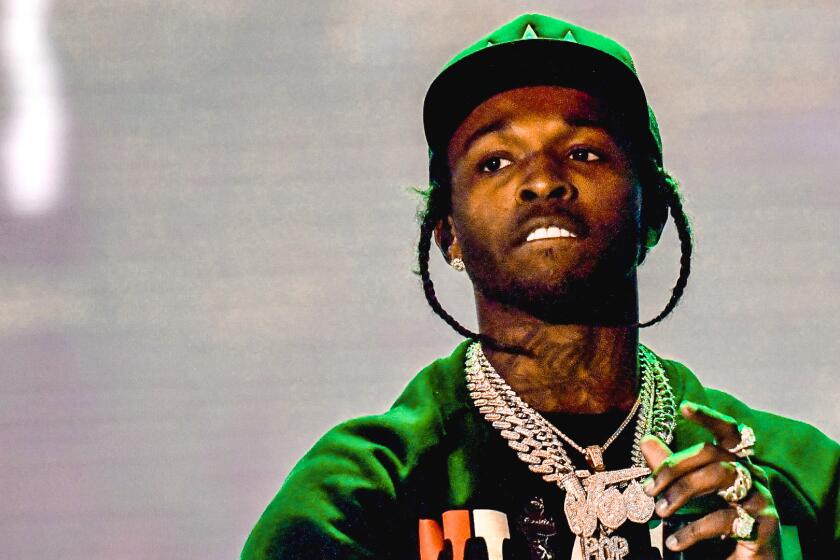Ambassador of the Latin Beat : Cuban jazz saxophonist-clarinetist Paquito D’Rivera will bring his blend of musical styles to UCLA on Friday
- Share via
If Bill Clinton decided to create the post of ambassador for Latin American musical affairs, saxophonist-clarinetist Paquito D’Rivera would be an ideal man for the job.
“I want people to meet and explore the many faces of Latin American music. It’s so limited what people know, there’s so much beauty in Latin American music that is ignored,” said the Cuban expatriate jazzman, 43, who has lived in the United States since 1980. D’Rivera will appear Friday with fellow ex-Cuban Arturo Sandoval at UCLA’s Royce Hall.
“I call it the ‘Carmen Miranda Syndrome,’ ” said D’Rivera, referring to the Portuguese film sensation of the ‘30s and ‘40s. Billed as the “Brazilian Bombshell,” she became a stereotype for anything musical from South America. Then D’Rivera shouted, in a perfect mimic of Desi Arnaz yelling at Lucille Ball, “Lucy ain’t home!” as if to further drive across the idea of Latin typecasts.
“I’m always talking to audiences, trying to give them a better understanding of our community, of our people, the differences and the similarities,” said D’Rivera, a native of Havana. He spoke in rapid-fire, thickly accented English during a phone interview from the home in Weehawken, N.J., that he shares with his companion of 11 years, singer Brenda Feliciano. “When you say ‘Latin,’ it’s not just one thing. We are different nationalities. The same roots but many leaves.”
Calling his band the Havana-New York Ensemble, D’Rivera practices what he preaches, playing programs that offer diverse aspects of Latin music blended with jazz. One current tune, “Lorenzo’s Wings,” is part mambo, part samba. Other numbers investigate such Argentine forms as the tango and the milonga --the latter a slow dance form that has been incorporated into the tango.
To ensure that his presentations are authentic, D’Rivera immerses himself in the music of other Latin cultures. “To combine these rhythms, you have to know how they work separately,” he said. “When I wanted to learn Brazilian music, I had only Brazilian musicians in my band for a while; I ate Brazilian food, I hung out with Brazilians. That way you know.”
The be-bop style of Charlie Parker, Thelonious Monk and Dizzy Gillespie, and the swing-era tones of Benny Goodman and Artie Shaw have also long interested D’Rivera. And as a classical prodigy, he made his concert debut at the age of 6, and at 10 performed the Weber Clarinet Concerto No. 2 at Havana’s National Theatre.
D’Rivera’s grasp of the jazz genre was sure, for after he defected in Madrid in 1980 he was quickly recruited by Gillespie for a tour of Europe with the trumpeter’s all-star Dream Band. Soon after, he became a regular with Gillespie’s small band and began his recording career, initially making nine albums for Columbia that demonstrated his prowess for delivering scintillating improvisations in any style, at any tempo.
Many musicians and writers share the high regard that Gillespie held for D’Rivera, among them former Newsday jazz critic Stuart Troup, who first interviewed the saxophonist in 1982. Troup wrote in the liner notes to the musician’s recent “Who’s Smoking?!” Candid Records album: “The excitement that D’Rivera’s U.S. arrival generated . . . hasn’t diminished. . . . The combined fire and honey that was in his playing from the start has deepened. The texture of his passages on alto and soprano--and in particular on clarinet--has turned silken. And his invention, always impressive, has flowered considerably.”
Gillespie, who died Jan. 6, and D’Rivera were close.
“For me . . . I don’t know . . . life will never be the same without Dizzy,” said D’Rivera. “Musically, it’s weird without him, something is very missing. You miss the great player and artist, but there is something else. I don’t have words. Dizzy, even on the day of his death, he served to put people together. There were so many people at St. John’s playing for him, making jokes, crying and smiling at the same time. He was a very positive spirit.”
D’Rivera mostly appears with his band--trumpeter Diego Urcola (originally from Argentina), pianist Danilo Perez (Panama), bassist Oscar Stagnaro (Puerto Rico) and drummer George Rossi (Spain). However, he also continues sporadically to perform as a clarinet soloist in the classical repertoire. In 1991, for the bicentennial of Mozart’s death, D’Rivera twice performed Mozart’s Clarinet Concerto, and this year he is performing the Weber Clarinet Concerto with the Costa Rica Symphony.
He acknowledged that the clarinet is far more demanding than the saxophone. “If I haven’t played it for a week, I know for sure that when I pick it up, it will scream at me, ‘Where have you been?’ ” he said, laughing.
The artist’s attitude about Latin American classical composers mirrors his feeling about the region’s popular forms: In general, people don’t know enough about them.
“These composers are as valuable as European composers, they just don’t have the exposure,” D’Rivera said. Brazilian composer Heitor Villa-Lobos “is beautiful, but there are a lot more.”
Paquito D’Rivera, along with Arturo Sandoval, appears at 8 p.m. Friday at UCLA’s Royce Hall. Tickets are $9 to $25. Call (310) 825-9261.
More to Read
The biggest entertainment stories
Get our big stories about Hollywood, film, television, music, arts, culture and more right in your inbox as soon as they publish.
You may occasionally receive promotional content from the Los Angeles Times.










